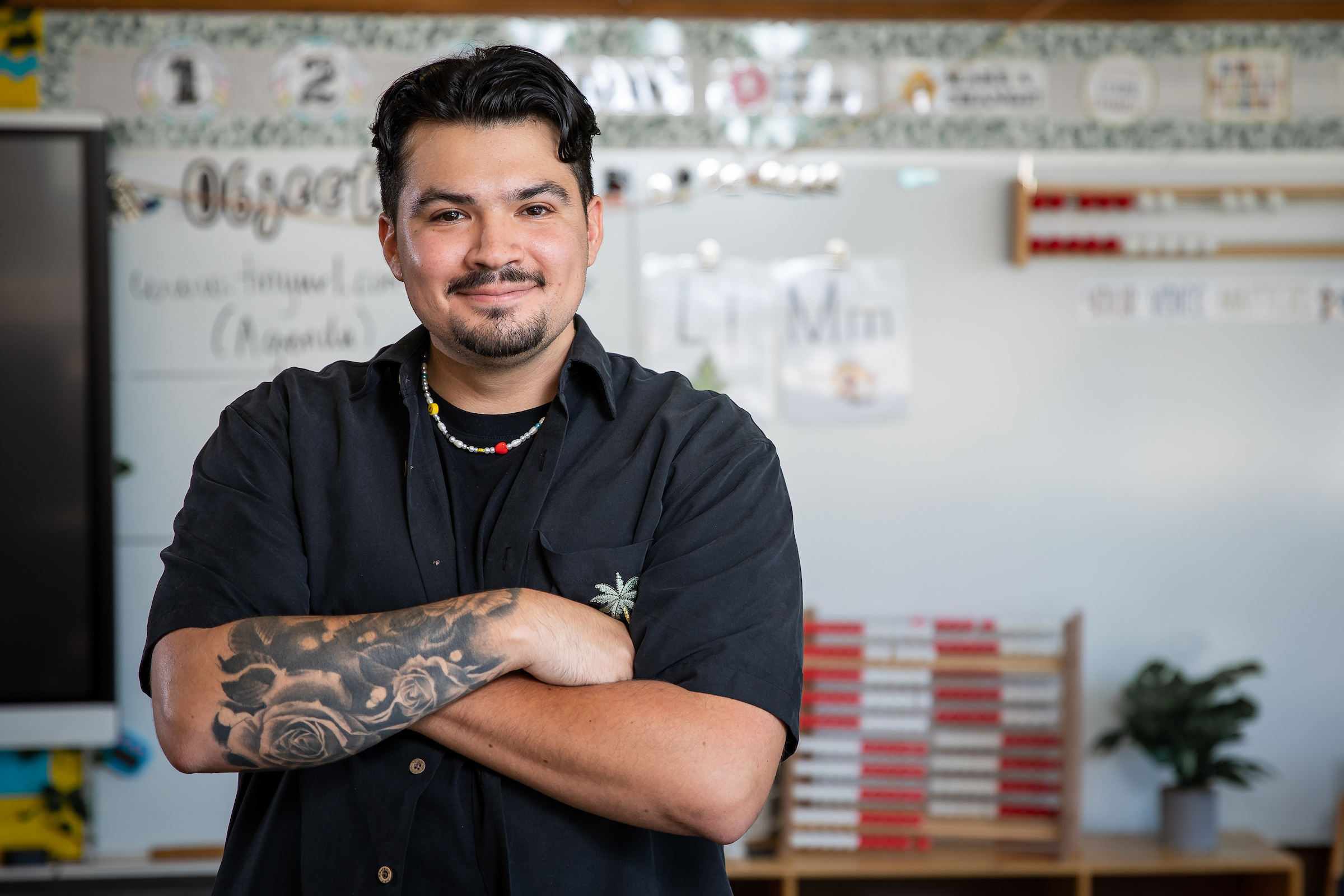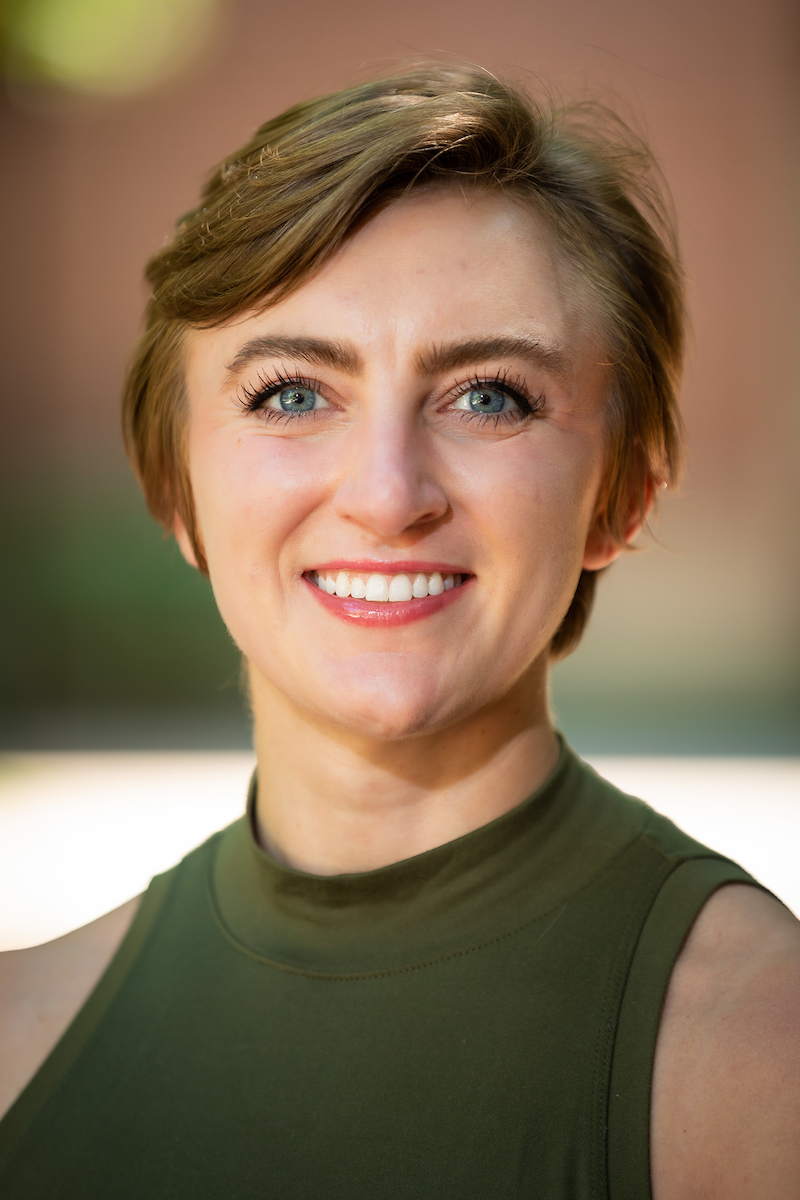 Diego Nunez graduated from DePaul’s combined bachelor’s and master’s degree in community psychology. He is applying an asset-based approach to building community in a new role at a public charter school. (DePaul University/Jeff Carrion)
Diego Nunez graduated from DePaul’s combined bachelor’s and master’s degree in community psychology. He is applying an asset-based approach to building community in a new role at a public charter school. (DePaul University/Jeff Carrion) Growing up in Queens, N.Y., Diego Nunez did not have many teachers who looked like him. While studying psychology as an undergraduate at DePaul, he felt called to develop community solutions to problems students face in and out of the classroom.
This fall, the recent DePaul grad plans to do just that with a new job as the first community school coordinator at
CICS West Belden, a public charter school on Chicago’s Northwest Side.
Nunez is part of the first cohort of 10 to earn master’s degrees in community psychology from DePaul this spring. The program, launched in 2020, offers students a community-based, social justice perspective on addressing the needs of those most vulnerable in society. Nunez says DePaul psychology faculty, including Olya Glantsman, shaped Nunez’s approach to the new role.
“I always want to bring the community mindset and ecological perspective Olya taught us: to teach the whole student and to incorporate community members and parents into our work,” Nunez says. “It’s beautiful because a lot of times students are just seen as a grade or an attendance number. They’re so much more than that, and DePaul taught us to dig a little bit deeper than what is on the surface level.”
Changing systems, and making sure it works
Community psychologists have a different approach to addressing mental health, Glantsman explains. In addition to learning how to conduct research and statistical analysis, students work alongside community members to change systems, inform policy and improve programs.
“When we learn about social problems and inequalities, community psychologists say, ‘What are we going to do about it?’ It’s important for our students to be thinking in those actionable steps,” says Glantsman, director of the master's program and an alumna of the Ph.D. program. “Many DePaul students have this Vincentian drive to take action.”
Glantsman and her psychology faculty colleagues Leonard Jason and Jerry Cleland saw the need for a master’s degree program that would help students like Nunez launch their careers. DePaul is considered one of the top community psychology programs in the U.S., with a well-respected Ph.D. program and the
Center for Community Research. Now they have created what is believed to be
the only master’s program in community psychology in the Midwest and are set to welcome the third cohort this fall.
What DePaul does differently, Jason explains, is offer a combination of rigorous research courses, experience in the field and an emphasis on reflection and evaluation.
“We have theory and research methods to guide us, so we’re not only exploring how to bring about change. We want to make sure it actually does occur,” Jason says.
Putting research into practice
In his new role, Nunez will put the school’s proposed community hub model into action, with a goal of removing barriers for children’s success and wellbeing. He will start by listening. DePaul students learn an asset-based approach to working with a community, pinpointing what’s already working rather than bringing in outside plans.
“We don’t work for the community, we work with them equally as partners,” Nunez says.
Already, Nunez has experience with some of the strengths families may bring. The student population at CICS West Belden reflects the thriving Latino community in its tight-knit neighborhood. Along with this, there are many students who are English-language learners, and Nunez sees this as an asset rather than a challenge. In one of his field work placements at DePaul, Nunez helped run an after-school program at a homeless shelter, working to boost literacy levels among children experiencing homelessness.
“No one person can do this all by themselves, so we’re building a team that is willing and invested,” Nunez says.
 Graduate student Ellie Buebendorf says DePaul’s community psychology program has strengthened her passion for social justice. (DePaul University/Jeff Carrion)Big problems and focused solutions
Graduate student Ellie Buebendorf says DePaul’s community psychology program has strengthened her passion for social justice. (DePaul University/Jeff Carrion)Big problems and focused solutions Ellie Buebendorf is entering her second year in the program and worked as an anti-racism accountability intern in Associate Professor Molly Brown’s
Homelessness Advocacy Research Collaboration lab. As an undergraduate transfer student, Buebendorf says coming to DePaul strengthened her passion for social justice and made community psychology a perfect choice.
“Large groups of people tend to have mental health issues when they have other environmental issues, such as homelessness, compounding them. The community psychology perspective is to address the housing issue first and to get to the root of the problem,” Buebendorf says.
Next up, Buebendorf will begin a field work project with ONE Northside, a community organization that advocates around many topics, including affordable housing, reducing gun violence, economic justice and mental health justice. She will be conducting research with the police accountability team. While many students breathe a sigh of relief after completing a statistics class, Buebendorf’s interest was piqued. She is finding her skills align with many appealing roles.
“Community psychology is broad and collaborates with a lot of interrelated fields. It presents a lot of opportunity for different roles, from an outreach coordinator or program evaluator to data analysis,” she says. “It’s really nice to have that flexibility.”